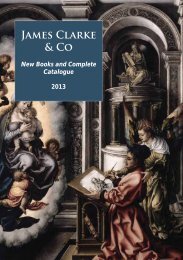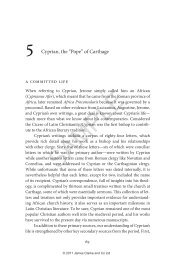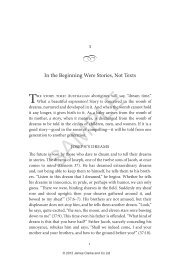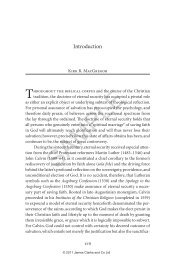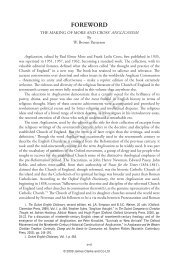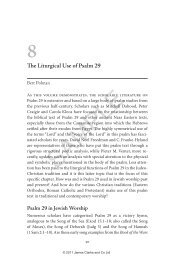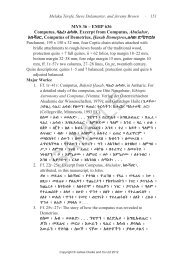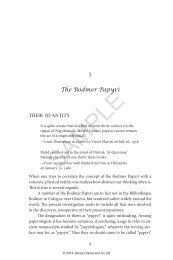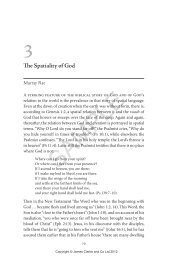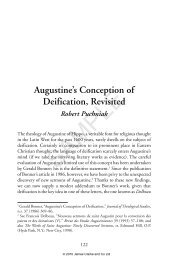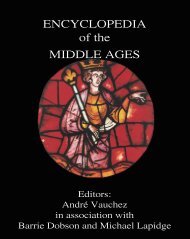Extract from Chapter 1 - James Clarke and Co Ltd
Extract from Chapter 1 - James Clarke and Co Ltd
Extract from Chapter 1 - James Clarke and Co Ltd
You also want an ePaper? Increase the reach of your titles
YUMPU automatically turns print PDFs into web optimized ePapers that Google loves.
54 MUSING WITH CONFUCIUS AND PAUL<br />
<strong>and</strong> apt when he writes, “So often the Paul who emerges <strong>from</strong> a scholar’s<br />
study is a Paul created in the scholar’s own image, one limited by the<br />
scholar’s own theological or ideological perspective, the issues of his own<br />
day.” 2 I am honored when I can read Galatians <strong>and</strong> Analects as a Chinese<br />
Christian, creating a <strong>Co</strong>nfucius <strong>and</strong> a Paul in my image. Gasque’s perspective<br />
is lopsided, since every reading process is intersubjective, <strong>and</strong> is<br />
therefore a constant shifting of images between the writer <strong>and</strong> the reader.<br />
It cannot be otherwise. I want to qualify what Gasque has said: Even the<br />
purportedly “objective” reading based on historical-critical methods is<br />
not without its own assumptions, for the presuppositions of exegetes are<br />
conditioned by their language <strong>and</strong> culture. Exegesis based on grammatical<br />
analysis is often deemed to render the most objective reading of the<br />
biblical text. Biblical scholars assume that the Greek grammar <strong>and</strong> syntax<br />
can reveal the objective meaning of the text. However, interpreters of the<br />
Bible using the same grammatical reading may offer diverse meanings of<br />
the same text. For we underst<strong>and</strong> grammar <strong>and</strong> history not according to<br />
objective <strong>and</strong> abstract principles, but in relation to our subjective, partial,<br />
<strong>and</strong> changing assumptions about language <strong>and</strong> history. Thus even grammatical<br />
reading is not without subjective input. Words become archaic,<br />
their referents unknown. Some texts contain words found nowhere else,<br />
<strong>and</strong> require an educated guess as to their meaning. In times past, much<br />
has been made of the precise explication of a text (exegesis), with warnings<br />
against reading into the text what is not there (eisegesis).<br />
The classic distinction between “exegesis” (reading objective, historical<br />
meaning out <strong>from</strong> the text) <strong>and</strong> “eisegesis” (reading subjective meaning<br />
into the text) may not be helpful once we move to a cross-cultural<br />
interpretation that seeks to honor perspectival readings. At best the “exegesis/eisegesis”<br />
concern might be a construct that assumes a scholar can<br />
transcend his culture <strong>and</strong> detach himself <strong>from</strong> his own time <strong>and</strong> place,<br />
yet be able to become immersed in the past <strong>and</strong> know it with certainty.<br />
At worst, the “exegesis/eisgesis” differentiation is a scholarly fear of living<br />
in partial knowledge, the insecurity of shared ownership of any text, or<br />
the alienation of self <strong>from</strong> the network of texts with which we all work. I<br />
am here assuming that a purely objective reading of <strong>Co</strong>nfucius <strong>and</strong> Paul<br />
that transcends culture is unrealizable. The language of <strong>Co</strong>nfucius (fifth<br />
century BCE Chinese) <strong>and</strong> Paul (first century CE Greek) is not always<br />
SAMPLE<br />
2. Gasque, “Images of Paul,” 8.<br />
© 2008 <strong>James</strong> <strong>Clarke</strong> <strong>and</strong> <strong>Co</strong> <strong>Ltd</strong>



